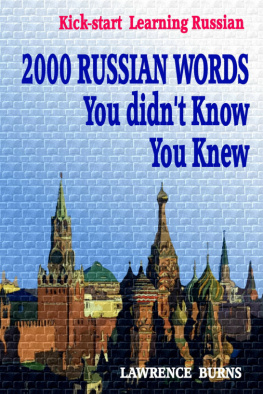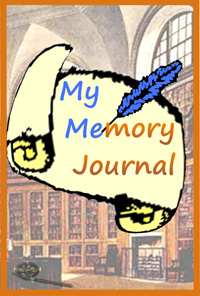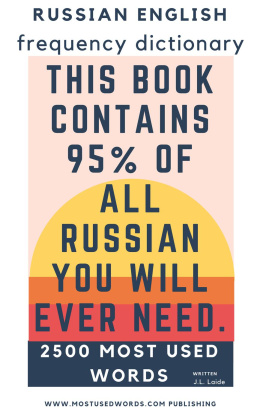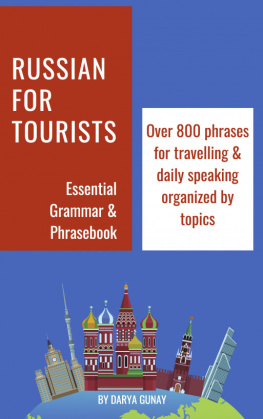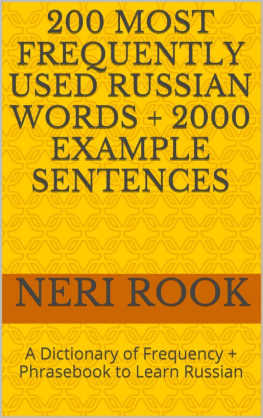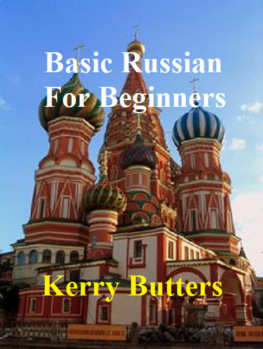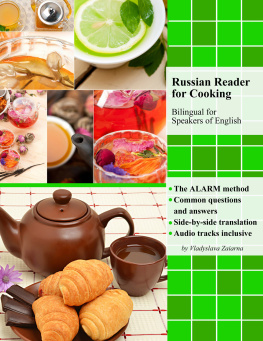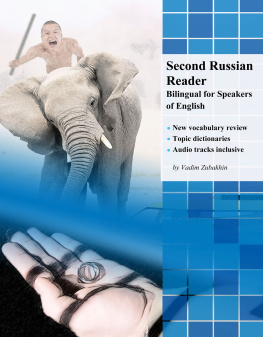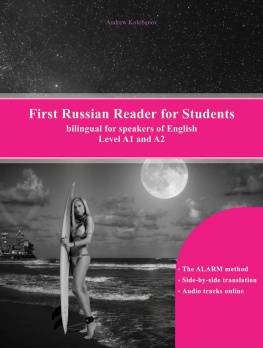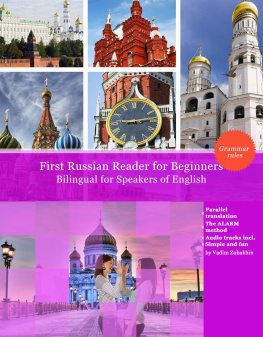Kick-start Learning Russian: 2000 RUSSIAN Words Youdidn't Know You Knew LAWRENCE BURNS Copyright 2018 by LawrenceBurns. All rights reserved. No part of this publication may bereproduced, distributed or transmitted in any form or by any means,including photocopying, recording, or other electronic ormechanical methods, without the prior written permission of thepublisher, except in the case of brief quotations embodied inreviews. Disclaimer The material in thispublication is of the nature of general comment only, and does notrepresent professional advice. It is not intended to providespecific guidance for particular circumstances and it should not berelied on as the basis for any decision to take action or not takeaction on any matter which it covers. Readers should obtainprofessional advice where appropriate, before making any suchdecision.
Therefore, if you wish to apply ideascontained in this book, you are taking full responsibility for youractions.
To the maximum extent permitted by law, the author andpublisher disclaim all responsibility and liability to any person,arising directly or indirectly from any person taking or not takingaction based upon the information in this publication. DEDICATION This book is dedicated with love tomothers Iris and Ninelia. They taught me speak. To the children Stephen, Alison,Ekaterina and Daria whom I love equally and who always kept me onmy toes. CONTENTS PREFACE Languages have words which can betraced back to sources in other countries. Many languages borrow/adopt words from each other.
Some words are constructed from theclassical ancient languages, such as Latin or Greek. Other wordsare borrowed from indigenous people. Most of these words can becalled "international" because their versions are used in manyEuropean languages and often are cross-cultural. Despite thelanguage people speak, all of them will understand, for example,the word mama. There are quite a few words in Russianthat are borrowed from English ( Listof English words of Russian origin ) or from otherEuropean languages. Some of the words are pronounced almost thesame as they are pronounced in English.
Some words have some smalldifferences in pronunciation, but you still will be able torecognize them. Some words in Russian language haveexactly the same pronunciation and meaning as English words. Forinstance, tennis , coffee , pizza , resume , passport , visa . Other words may sound thesame in Russian as English words but have completely differentmeaning. For example, English word look in Russian languagesounds exactly like onion. Additionally, words may look veryfamiliar and have the same meaning in both languages but they maynot sound the same when you hear them with a stress on a differentsyllable.
The majority of geographical words(countries, cities, etc.) are pretty close to what they are inEnglish: America , Las Vegas - . As there are somany geographical words, you wouldnt find it here. Also, brandnames and company names should never be translated: The Beatleswill be always Beatles () and Red Hat wouldnt be (Krasnaya Shlyapa) but . Red Square shouldnt betranslated from Russian as Red Square but should be pronounsed asKrasnaya ploshchad (Russian researchers saysthat the name Krasnaya didnt come from color red but from theword (handsome, lovely, or beautiful). Rock-n-Roll willbe --, Pop Music will be -, and Ping Pong willstill be -. Number of foreign words in everydayRussian speech from year to year increases exponentially.
Forexample, (leasing), (cleaner), (market), (offline), (penthouse), (provider), (profile), (resume), (screenshot), (traffic), (fundraising), (franchise), (cheesecake), (shopping), (show), (extreme) andthousand more words. The purpose of this book wasnt towrite a research thesis about origin of everyday words, but toshare the words that sound the same (or almost the same) in Englishand Russian languages and have similar meaning. Our language ischanging at a terrifying rate. There are almost two thousand wordshere for you (wouldnt it be cool to tell your friends in a weekthat you know more than thousand Russian words?). It could be agood start to learn Russian language as you have already built apart of your Russian vocabulary. Who This Book IsFor This book is for the reader who simplywants to have fun and expend their knowledge of a foreign languageor for readers who wants to build Russian vocabulary based onsimilarity between English and Russian words quickly.
The Convention in ThisBook Bold type shows the syllable we need toaccentuate (stress) in order to pronounce the wordcorrectly. Why is Word/Letter StressImportant? Word stress is not used in alllanguages. Japanese, for example, pronounce each syllable withequal emphasis. In English, word stress is part of the language. Wejust dont notice this rule. Lets take a wordInternationalization.
We know that the stress is on a last lettera, not on any other vowel. In Russian, the stress is a part ofthe language, too. Main rules about stress are the same in bothlanguages:
- One word has only onestress.
- We can only stress vowels, notconsonants.
When you learn a new word in anylanguage, you need also learn its stress pattern. Otherwise nobodywill understand what you are trying to say.
For example, a Russianword . is a body part and is a musical instrument.Some other examples: (lock) (castle), M (flour) M (excruciation). Rules about stress in Russian languageare rather complicated and there are many exceptions. But dontworry its always better to feel the language and everythingelse will come naturally. THE RUSSIANALPHABET The Russian alphabet (Russian: , transliteration: russkij alfavit) uses letters from theCyrillic script and consists of 33 letters. - Pronounced likethe "v" in "vacuum". - Pronounced likethe "g" in "gadget". - Pronounced likethe "d" in "design". - Pronounced likethe "ye" in "yes". - Pronounced like"yo" in "yoghourt". - Pronounced like"s" in "leisure", "pleasure". - Pronounced likethe "z" in "zebra". - Pronounced likethe "i" in "index". - Pronounced likethe "y" in "yum". - Pronounced likethe "c" in "calendar" or "k" in "kangaroo". - Pronounced likethe "l" in "love". - Pronounced likethe "m" in mango. - Pronounced likethe "n" in "no". - When stressed,it is pronounced like the "o" in "shop". - When stressed,it is pronounced like the "o" in "shop".
When un-stressed it ispronounced more like the letter "a". - Pronounced likethe "p" in "park". - Pronounced likethe "r" in "radio". - Pronounced likethe "s" in "secret". - Pronounced likethe "t" in "tiger". - Pronounced likethe "f" in "face". - Pronounced likethe "h" in "ham". - Pronounced likethe "ts" sound in "tsunami". - Pronounced likethe "ch" in "chair". - Pronounced likethe "sh" in "shape". - You may find itdifficult to hear the difference between "" and "". - You may find itdifficult to hear the difference between "" and "".
Try puttingyour tongue in the same position as you would to say "tia" in"dementia" but say "sh" instead. - The 'Hard Sign'is rarely used. It indicates a slight pause between syllables. - Pronounced likethe "i" in "bit" or "ill". - The 'Soft Sign'makes the previous letter soft. - Pronounced likethe "e" in "eclair". - Pronounced likethe "u" in "humor". - Pronounced likethe "ya" in "yahoo". - Pronounced likethe "ya" in "yahoo".
So lets begin! A English RUSSIAN PRONONSIATION aboriginal ABORIG E N ACADEMY AKAD E MIYA ACCENT AKTS E NT ACCORD AKK O RD AccountManager - akk A unt-m E nedzher ACOUSTICS AK U STIKA Acrobat AKROB A T ACT A KT ACTIVE AKT I VNYY ACTOR AKT I O R actress aktr i sa ADDRESS A DRES ADMINISTRATION ADMINISTR A TSIYA administrator administr a tor admiral admir a l ADVERTIZING advert a yzing ADVOCATE ADVOC A T AEROBIC AER O BIKA Aerodynamics AERODIN A MIKA Affect AFF E KT aftershock A FTERSH O K AGENT AG E NT AGGRESSION AGR E SSIYA AIRPORT AEROP O RT ALBUM AL'B O M ALCOHOL ALKOG O L' ALGEBRA A LGEBRA ALIBI A LIBI ALLERGY ALLERG I YA ALLEY ALL E YA ALUMINIUM ALYUM I NIY AMBITION AMB I TSIYA ANACONDA ANAK O NDA ANAESTHESIA ANESTEZ I YA ANALOG ANAL O G ANALYSIS ANAL I Z ANATOMY ANAT O MIYA anchovy ANCH O US anecdote ANEKD O T ANGEL A NGEL anonym AN O NIM ANTARCTICA ANT A RKTIKA ANTHOLOGY ANTOL O GIYA ANTIBIOTIC ANTIBI O TIK anticyclone A NT I TSIKL O N APOCALYPSE APOKAL I PSIS APPETITE APPET I T AQUARIUM AKV A RIUM Archaeologist ARKHE O LOG ARCHITECT ARKHIT E KTOR ARCHITECTURE ARKHITEKT U RA Aristocrat ARISTOKR A T Arithmetic ARIFM E TIKA ARMY A RMIYA AROMA APOMAT APOM A T ASBESTOS ASB E ST ASSISTANT ASS I ST E NT ASSOCIATION ASSOTSI A TSIYA ASTEROID ASTER O ID ASTROLOGY ASTROL O GIYA Asymmetry ASIMM E TRIYA ATHEIST ATE I ST Athlete ATL E T ATMOSPHERE ATMOSF E RA AUCTION AUKTSI O N AUDIO A UDIO AURA A URA AUTHOR A VTOR Autobiography AVTOBIOGR A FIYA AUTOMATIC AVTOM A T automobile AVTOMOB I L' AUTOPILOT A VTOPIL O T AVIATION AVI A TSIYA AXIOM AKSI O MA B
Next page
